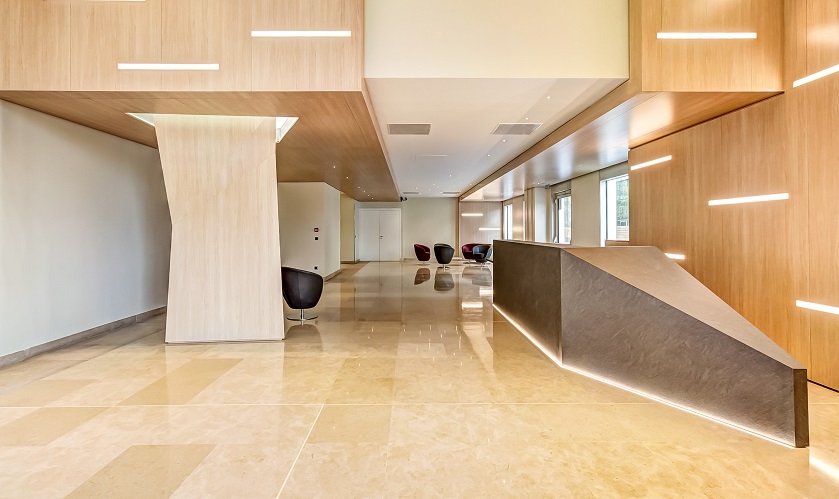According to a report by Arab News, the Middle East real estate market will remain strong in 2023, driven by elevated oil prices and resolute economic growth.
Cities like Dubai, Abu Dhabi, Riyadh, Doha, and Kuwait City are known for their expensive commercial real estate markets. These cities are major economic centers in the Middle East, attracting businesses and investors from around the world.
With the advent of digitalization, the commercial real estate landscape in the Middle East has evolved to meet the demands of modern businesses. In this blog, we will explore how building automation and workspace management systems are reshaping the commercial real estate industry in the Middle East.
The Rise of Digitalization in Commercial Real Estate
As businesses increasingly prioritize efficiency, sustainability, and cost-effectiveness, the integration of digital technologies has become essential in managing their workspace needs.
A significant advancement in commercial real estate is building automation.
In the Middle East, where extreme temperatures are common, a building automation system (BAS) can regulate HVAC systems, lighting, and other utilities to ensure a comfortable and energy-efficient environment for occupants.
When integrated with a workspace management system, BAS can automatically switch on and off lighting, ACs, etc. in a particular workspace depending upon occupancy. Thus, helping businesses significantly reduce their energy consumption and operational costs.
Workspace Management Systems
Workspace management systems have become vital in the digitalization of commercial real estate in the Middle East. These intelligent platforms provide a comprehensive solution for managing and optimizing workspace usage.
The Middle East’s commercial real estate market has witnessed a surge in demand for flexible workspaces, co-working spaces, and shared office concepts. This shift in workspace preferences is partly attributed to the rise of the start-up culture and the gig economy.
A workspace management system empowers property managers to efficiently allocate and monitor shared spaces, ensuring maximum utilization and cost-effectiveness for both businesses and property owners.
Moreover, a workspace management system offers advanced analytics and data insights. These invaluable metrics enable businesses to identify occupancy patterns, peak hours, and workspace preferences, allowing them to make data-driven decisions.
The Benefits of Embracing Digitalization
Enhanced Energy Efficiency
Building automation systems enable better control over energy-consuming devices, reducing wastage and lowering carbon footprints. In a region where sustainability is gaining momentum, these eco-friendly practices positively impact a company’s reputation.
Improved Tenant Experience
For commercial real estate developers, providing a seamless tenant experience is crucial. With digitalization, they can offer smart office spaces equipped with modern technologies, such as biometric access, smart parking, and mobile-based booking systems. All these elevate the overall tenant experience.
Cost Savings
Digitalization optimizes resource usage, leading to reduced operational costs in the long run. Businesses can leverage data-driven insights to negotiate better lease agreements and make informed decisions about space utilization.
Enhanced Security
Building automation systems bolster security measures by integrating surveillance cameras, access controls, and alarm systems, ensuring a safe environment for occupants.
Attracting Talent
In the competitive business landscape of the Middle East, adopting digitalization like investing in an innovative workspace management system can be a powerful draw for top talent seeking dynamic and modern work environments.
Hypothetical Cases
Imagine that a certain company implemented a workspace management system to improve the efficiency of its workspaces. The system would help the company to:
- Track the utilization of its workspaces
- Identify underutilized spaces
- Reallocate spaces to better meet the needs of employees
- Reduce the amount of space that the company was leasing
As a result of the implementation of the workspace management system, the company would be able to save a lot of money through reduced use of real estate.
Imagine another company implemented a workspace management system to improve the flexibility and efficiency of its workspaces. The system would help them to:
- Allow tenants to book workspaces on a flexible basis
- Provide tenants with real-time information about the availability of workspaces
- Improve the efficiency of their leasing process
As a result of adopting digitalization, they would be able to attract new tenants and increase the occupancy rate of its workspaces.
Conclusion
According to the 2022 Microsoft Work Trend Index report as mentioned by ET HR World THE MIDDLE EAST, 98% of UAE businesses revealed they would invest in hybrid workplace technology by 2024, compared to 89% globally.
Building automation and workspace management systems are two such hybrid technologies that offer a plethora of benefits to cater to the needs of modern businesses.
By adopting digitalization, the region’s commercial real estate industry can usher in a new era of innovation, sustainability, and growth, setting a benchmark for the rest of the world to follow.





